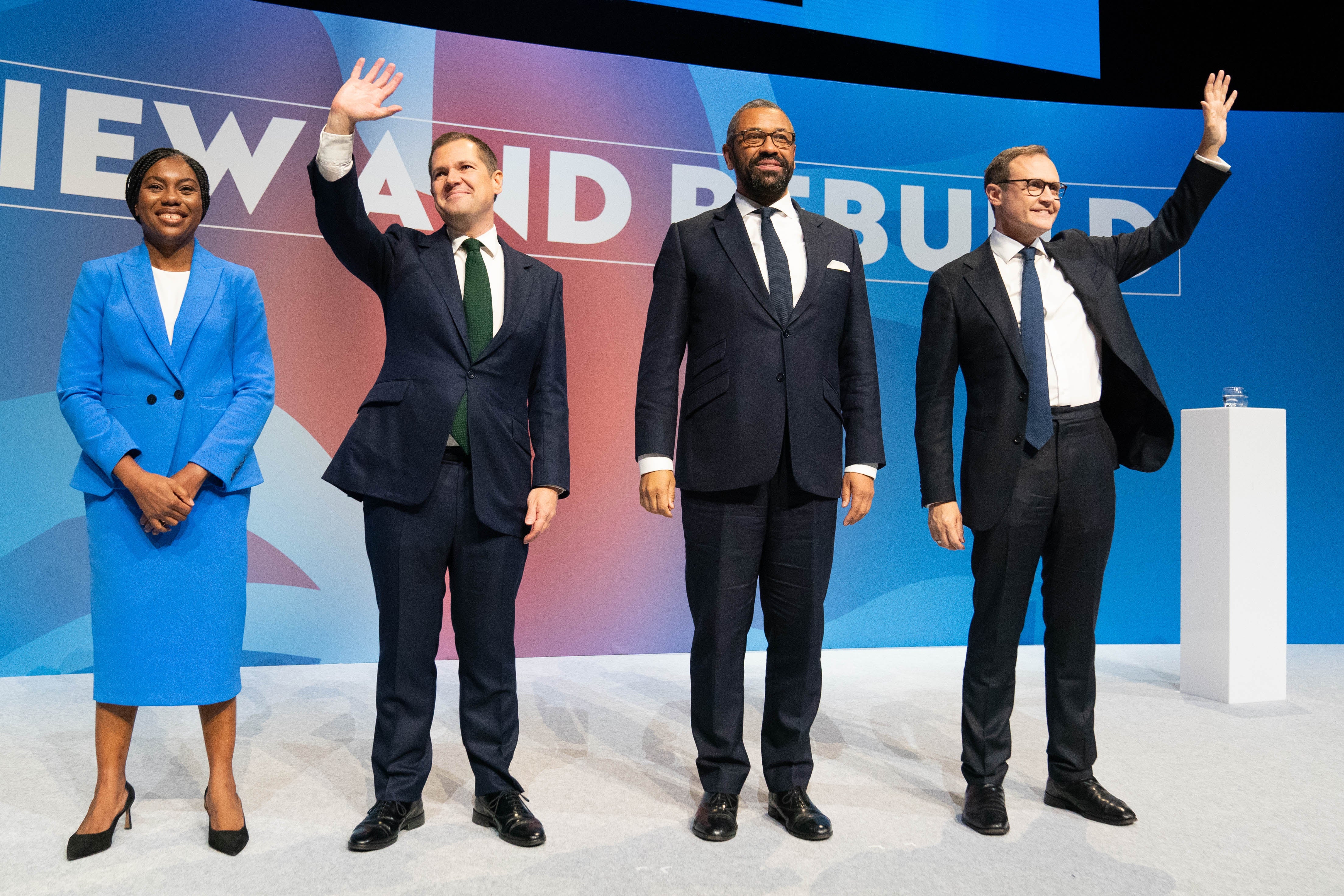If ‘let’s be normal’ is now the rallying cry from the Tory party, then they’re really in trouble
Finally, it was the climax of the week for the Conservative candidates; the chance to pose on stage with an audience of 1,900 and show their real selves. If only they hadn’t, writes Joe Murphy


Let’s be more normal,” said James Cleverly. Then grinned to show he didn’t really mean it. After all, if you are appealing for votes to the minuscule sliver of society that attends Tory conference, it’s probably best not to antagonise the hall by being against weird people.
Facing the Birmingham stage was the electorate that will pick the next leader of His Majesty’s Loyal Opposition and perhaps future prime minister. Elderly, mainly white, outmoded in speech and dress. A deatherendum unfolding. As Robert Jenrick unkindly observed, a sixth of Tory supporters won’t survive to vote in the next election. Some looked as if they might not last the conference.
The four contestants were introduced by chief whip Stuart Andrew, who joked that he might bump them off, like Francis Urquhart in the original House of Cards. That won a titter, not least from Michael Gove and George Osborne, two veterans of Tory-style games of murder in the dark. For three days, the contestants for the Conservative leadership have exhibited all the gravitas of four drunks shouting in the back of a passing Uber.
Finally, it was the climax of the week, the chance to pose on stage like an actual leader with an audience of 1,900 and show their real selves.
First up was Tom Tugendhat, widely portrayed as the most grown-up, though he chose not to parade those attributes. The lectern was removed, signalling he would “do a Cameron” and speak without notes.
A campaign video then showed images of Tom, clad in khaki, serving in Afghanistan, gun at the ready.
Disappointingly, the man on stage looked nothing like the dashing hero. Tugendhat’s tie dangled six inches below his belt and his suit looked ready for a makeover by Lord Alli.
“I served our country and I faced the enemy … I know what leadership demands … I have never failed a mission yet.” He managed to work the words “battle”, “mission” or “fight” into every other sentence. “It’s not about cheap rhetoric,” he warned, a jibe intended to make Robert Jenrick’s ears burn.
Not that Tom eschewed cheap rhetoric. “When Keir Starmer thinks of service he thinks of free tickets to Taylor Swift.” He also promised to cap net legal migration at 100,000, without saying how.
As he left the stage, to staged chants of “Tom, Tom, Tom” but mainly polite applause, it looked like mission impossible.
Excitingly, the lectern was carried back onto the stage, meaning that Cleverly was going to make a speech the old-fashioned way. A smart decision, as Tories love a traditionalist far more than they like modernisers.
He strolled on stage slowly, like Trump, pointing to imaginary friends in the crowd, milking every step, letting everyone know how at home he was with this crowd. A white hanky gleamed from his breast pocket. Ooh, yes, they like that sort of touch.
“Why are we here, what’s the purpose?” he asked. He could, instead, be spending “more time with my Warhammer figures”. They applauded enthusiastically this revelation. Who knew that the Conservative grass roots appreciated tabletop fantasy war games?
“There’s something we need to say,” went on Cleverly: “Sorry.” Not, alas, to the country but to the Tory faithful let down by squabbling MPs.
Cleverly milked his advantage of being well known to the hall. A mate of Boris, party chair in the 2019 landslide, briefly a foreign secretary and home secretary. But even more advantageous, he possesses the gift of telling simple stories that engage with people, like his hero, Ronald Reagan.
He related how his mum came to the UK from Sierra Leone and he was “gutted” that she did not live to see him visit her native land as foreign secretary. His dad was raised on a council estate, while he, a mixed race teenager, was brought up in Lewisham.
Then he told how he could “hardly speak” when his wife learned she had breast cancer. He had run a small business and “I know what it’s like to work crazy hours to put food on the table.”
Cleverly’s most important message was about Nigel Farage’s Reform party. Indeed, he was the only candidate to properly address the Banquo lurking at the Tory feast.
“No mergers, no deals,” he declared squarely. Reform were just a pale imitation. The Conservatives would win by being “the best version of ourselves” and not by “stitch-ups” with their rival. It was “no time for an apprentice” to take charge, he said, mocking his rivals’ relative inexperience.
Then the lectern was removed for the last time. Robert Jenrick has made quite a thing about speaking without notes and waving his arms a lot.
However, he went into a long, dull lecture about how the Conservative Party in 1974 reversed its decline and ended years of stagnation by electing Margaret Thatcher as leader and marching to victory in 1979. Which sounded fine except that Margaret Thatcher was elected leader in February 1975. Perhaps a written text might be better next time.
He also went on too much about how his dad worked at Cannon’s iron foundry. Please, not another horny-handed dad story so soon after the toolmaker. What he didn’t mention is that, according to the local history society, Cannon’s was sold off and demolished in the deindustrialisation of the Thatcher/Major years. It’s a housing estate now.
“I loathe empty rhetoric,” he assured us, just before promising both more homes for the young and more say for local nimbys in the planning process.
He would “end illegal migration for good”, and freeze net migration and “cast it in iron”. Better examples of empty rhetoric would be hard to find.
Finally, Kemi Badenoch took the stage after an arty video that featured an endorsement from Tony Abbott, the former Oz PM.
Wearing a pale blue suit that carried echoes of Maggie, she began by saying: “It is time to tell the truth.” Her truth was that everything was broken and the previous Conservative government hadn’t been clear about the mess they oversaw.
Badenoch’s most compelling passage was about how her childhood in Nigeria shaped her views on security. “I grew up in a place where fear was everywhere. Waking up in the night, listening as your neighbours scream, wondering if your home will be next.
“When you’ve experienced that kind of fear you don’t worry about being attacked on Twitter.”
However, she soon reverted to the word soup of culture war tropes that hallmarked her disastrous interviews this week. Pro-wealth, anti-trans activists, doesn’t like “Islamic thugs”, wants to unshackle the economy, etc. She also claimed students are routinely marked down by uni lecturers if they admit to being Tories.
“We will rewire, reboot and reprogramme. Nothing is more exciting to me. I am an engineer,” she said. Her delivery was slow paced, but sounded bossy.
At the end, all four candidates paraded on stage, ignoring the uncomfortable fact that half of today’s speeches were a complete waste of time because only two will go forward to a ballot of members. Naturally, Tory MPs, who will pick the final pair, have largely made up their minds already on the basis of what jobs they have been promised.
Join our commenting forum
Join thought-provoking conversations, follow other Independent readers and see their replies
Comments
Bookmark popover
Removed from bookmarks